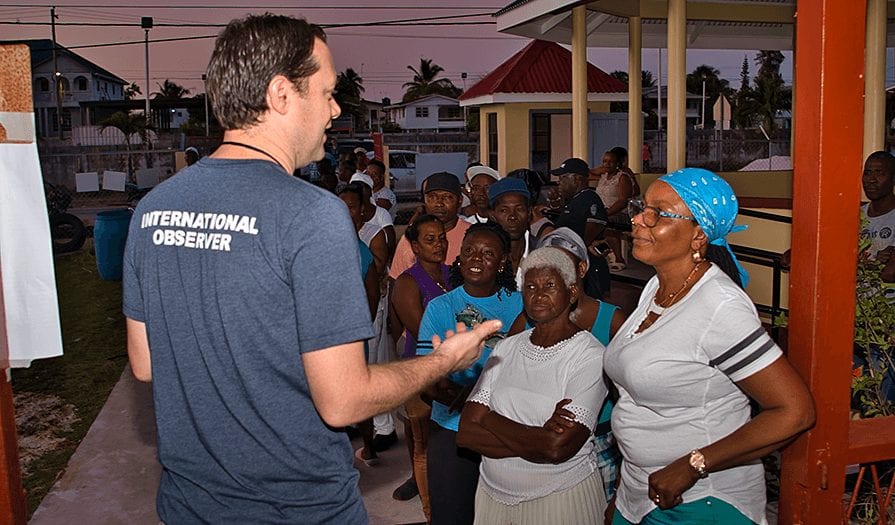(The Carter Center) On March 2, citizens of Guyana went to the polls for what the country was calling “the mother of all elections.”
Every election is important, of course, but this one was deemed especially so because five years ago, Exxon discovered massive amounts of oil off the coast of Guyana. The first barrels hit the market in January. Now this small, poor nation is poised to become a very rich one. And the country’s two major political parties – which are divided largely along ethnic lines – desperately want to control the coming wealth.
The 2020 election came more than a year after a National Assembly no-confidence motion against President David Granger in December 2018. The ruling party challenged the motion in the courts for months but lost. The newfound oil revenue, many Guyanese believe, could keep the winner of the 2020 election in power for decades.
“The stakes in this election are very high,” said David Carroll, director of the Carter Center’s Democracy Program. “One major political parties’ base is mostly Afro-Guyanese, and the other is mostly Indo-Guyanese, and elections tend to bring longstanding ethnic tensions to the surface. Because The Carter Center has a long history in Guyana – President Carter first led an election observation mission there in 1992 – and is seen as a trusted partner, it was important for us to observe this election.”
The Center deployed a team of 10 election experts and long-term observers to Guyana in January, and in late February, they were joined by more than 30 short-term observers led by Aminata Touré, former prime minister of Senegal, and Jason Carter, chair of The Carter Center Board of Trustees.
“Guyana stands at a crossroads,” Carter said. “Not only is it critical that this election is seen as credible, it’s also essential that it serves as a springboard to a future that is more inclusive and so that all the people of Guyana can share in this new wealth.”
Election day proceeded smoothly. The Center’s observers sent back mostly positive reports from all 10 of the country’s regions. But tallying went astray in Region 4 – which is the largest region and includes the capital of Georgetown – when, after only half the results for the region had been tabulated in the presence of observers, the returning officer responsible for the tallying abruptly announced the rest of results, which indicated that the ruling party had come from behind to win the election.
The Carter Center and other international observer missions denounced the declaration of unverified results, saying they lacked credibility, and called for a return to the verification process. The opposition party filed a lawsuit, and Guyana’s chief justice ordered a return to the previous tallying process. But the restarted process didn’t meet the standards set by the court, according to Carter Center observers and others.
Days later, the leaders of the two parties agreed to a recount supervised by the Caribbean Community (CARICOM), but an injunction filed by ruling party supporters has halted the recount, for now.
And so the country – and the world – waits.
Four weeks after election day, Guyana still doesn’t have a new president. The Carter Center – concerned about the stalled process, international travel restrictions brought on by the Covid-19 virus, and harassment of observers by ruling party supporters – made the difficult decision to pull its observers out of the country on March 20.
“We’re still committed to observing the entire electoral process,” said Brett Lacy, an associate director in the Center’s Democracy Program. “Nonpartisan observers have an important role to play. We report what we see and hear to the rest of the world. Whoever wins the election should want to ensure that their victory is seen as credible.”
The Center said it is also committed to supporting constitutional reform in Guyana.
“The Carter Center has long believed that Guyana needs to reform its constitution and electoral laws to get rid of its winner-takes-all election system, which tends to exacerbate conflict,” Carter said. “We believe it is critical for Guyana to make these changes to help make it possible for Guyanese to live together in peace and prosperity.”
UPDATE:
The Full Court in Guyana on Tuesday, March 31, discharged the injunctions granted by the High Court on March 17 that stopped the Guyana Elections Commission (GECOM) from conducting a national recount of votes. GECOM now has to decide if it will conduct a recount or proceed to declare a winner based on the declaration of results which observers and other stakeholders say are not credible.




